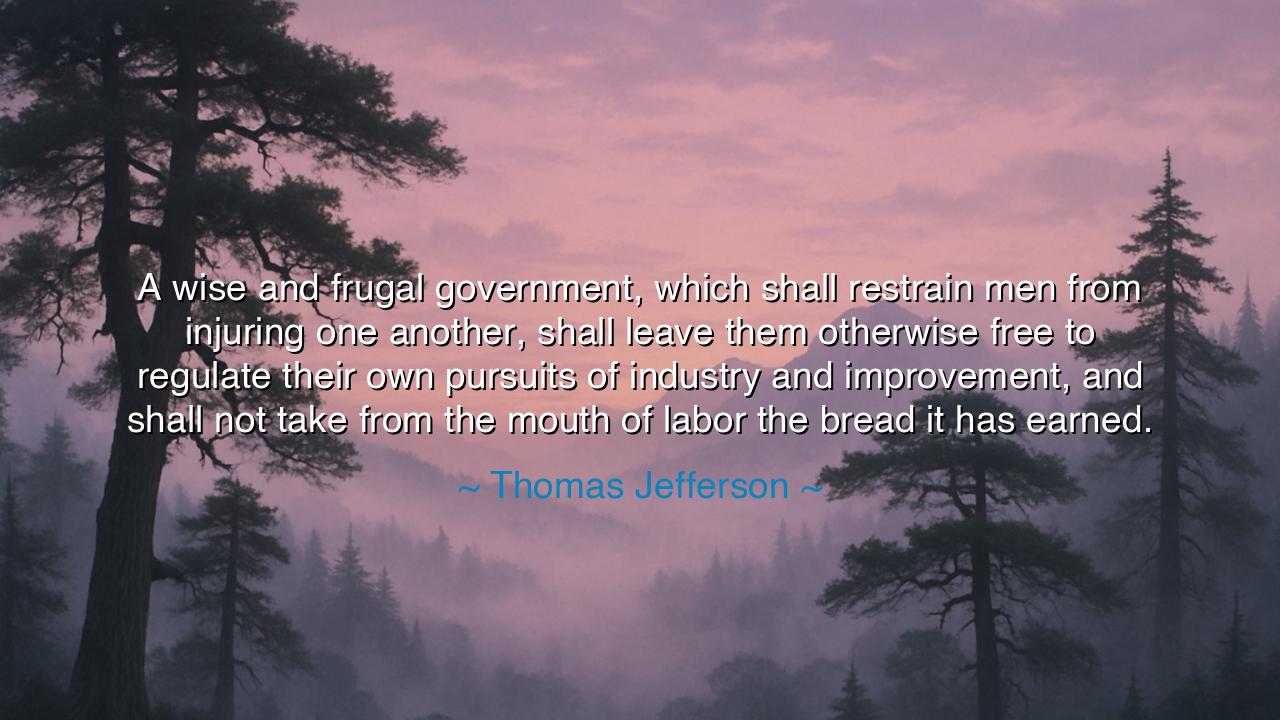
A wise and frugal government, which shall restrain men from
A wise and frugal government, which shall restrain men from injuring one another, shall leave them otherwise free to regulate their own pursuits of industry and improvement, and shall not take from the mouth of labor the bread it has earned.






The words of Thomas Jefferson resound through the ages like the measured toll of a liberty bell: “A wise and frugal government, which shall restrain men from injuring one another, shall leave them otherwise free to regulate their own pursuits of industry and improvement, and shall not take from the mouth of labor the bread it has earned.” These words, drawn from his first inaugural address in 1801, are not the speech of a conqueror, but the creed of a shepherd—one who believed that the purpose of government was not dominion, but protection, not control, but freedom. In this quote, Jefferson reveals the sacred balance of republican virtue: that the state exists to safeguard liberty, not to suffocate it; to defend justice, not to consume the fruits of honest toil.
To understand this quote is to understand the very soul of Jeffersonian democracy. The new republic he led was born from rebellion against tyranny—against kings and parliaments that taxed without mercy and ruled without consent. Jefferson’s dream was of a nation where the individual stood tall, answerable to law but free in enterprise, faith, and thought. A wise government, in his eyes, was one that acted as a guardian against harm, not as a master over life. And a frugal government was one that lived within its means, never taking from the laborer the reward of his own sweat. For he knew that when rulers feast upon the earnings of their people, liberty withers and tyranny returns by a different name.
The ancients, too, understood this truth. In the old republics of Greece and Rome, it was not armies that first brought ruin, but corruption and excess. When governments grew rich from taxes and bloated by bureaucracy, they forgot the humble citizen and served only their own grandeur. Jefferson, who studied these civilizations as a student of history and virtue, saw in their decay a warning for his own time. “Frugality,” he knew, was not stinginess, but discipline—the wisdom to rule with restraint, to govern for the sake of the people, not the glory of power. For a government that cannot master its appetite soon becomes a predator upon its own citizens.
And yet, Jefferson’s vision was not one of anarchy or isolation. He believed in law, in the necessity of justice to keep men from harming one another. A society without law descends into chaos, where the strong prey upon the weak. But a society overruled by law loses its vitality, where the spirit of innovation and industry suffocates beneath red tape and taxes. Thus, Jefferson’s “wise and frugal government” stands between these two extremes—a government of firm principles but light touch, a government that guards without grasping. Like a gardener, it prunes the weeds of injustice, but allows the tree of liberty to grow freely in the sun.
History offers shining examples of the wisdom Jefferson proclaimed. When the early United States faced crushing war debts, Jefferson and his allies sought to reduce spending and pay down obligations rather than impose endless taxation. His philosophy of restraint contrasted sharply with empires that drained their people to fund endless wars. Even in modern times, we see nations rise or fall by this measure. Those that burden the worker with excessive taxes and needless bureaucracy see the spirit of labor fade; those that trust their people to create, trade, and build see their societies flourish in vigor and dignity. For when the state honors the efforts of its citizens, the citizens in turn honor the state.
But Jefferson’s words carry a warning for our own age. As governments grow in size and reach, promising safety, ease, and endless provision, they risk forgetting the principle of frugality that preserves both liberty and virtue. A people who yield too much of their independence to authority may gain comfort for a moment, but they lose strength for a generation. The bread that labor earns must never be stolen—not by the tax collector’s hand nor by the indifference of wasteful rule. For every coin taken unjustly from the worker’s pocket weakens the moral bond between government and governed, between duty and freedom.
Therefore, let this teaching be passed down to every free soul: the purpose of government is to protect, not to possess. It must defend the peace, uphold the law, and let the people live in dignity and enterprise. Let those who govern remember that the wealth of a nation lies not in its treasuries but in the strength, virtue, and independence of its people. And let those who labor never forget that freedom demands vigilance—that every right not guarded will one day be taken.
For as Jefferson taught, the bread of labor is sacred—it is the fruit of effort, the measure of freedom, the proof that a man may shape his own destiny. A wise and frugal government honors this truth; it governs with humility, trusting its people more than it trusts its own power. Such a government does not bind with chains but guards with laws, leaving every citizen free to pursue his own improvement and happiness beneath the sun of liberty. And when such wisdom endures, the republic stands—not as the triumph of rulers, but as the triumph of the free.






AAdministratorAdministrator
Welcome, honored guests. Please leave a comment, we will respond soon